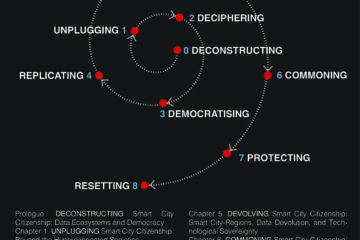
Smart City Citizenship: A Techno-Political Review (of Cities and Nations)
COVID-19 has hit European citizens dramatically, not only creating a general risk-driven environment with a wide array of economic vulnerabilities but also exposing them to pervasive digital risks, such as biosurveillance, misinformation, and e-democracy algorithmic threats. Over the course of the pandemic, a debate has emerged about the appropriate techno-political response when governments use disease surveillance technologies to tackle the spread of COVID-19. Citizens have pointed out the dichotomy between state-Leviathan cybercontrol and civil liberties. Moreover, the giant technological flagship firms of surveillance capitalism, such as Google, Amazon, and Facebook, have already assumed many functions previously associated with the nation-state, from cartography to the disease surveillance of citizens. But particularly, amidst the AI-driven algorithmic disruption and surveillance capitalism, Smart City Citizenship sheds light on the way citizens …

Civil service infighting threatens UK’s only hope for digital government
Technology and the public sector have rarely been happy bedfellows in the UK, where every government technology project seems doomed to arrive late, unperform and come in over budget. The Government Digital Service (GDS) was created to drag the civil service into the 21st century, making services “digital by default”, cheaper, faster, and easier to use. It quickly won accolades for its approach and early cost savings. But then its leadership departed, not once or twice but three times – the latter two within the last few months. The largest government departments have begun to reassert their authority over GDS expert advice, and digital government looks likely to be dragged back towards the deeply dysfunctional old ways of doing things. GDS isn’t perfect, but to erase the progress it …









